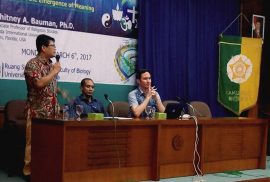Anang G Alfian | CRCS | News

Universitas Gadjah Mada’s Faculty of Biology invited Whitney Bauman to present his on-going project at the Biology Hall on Monday, March 6th, 2017. Students and lecturers from various faculties came to hear his lecture. His specialization on the discourse of religion, science, and nature reflects his capacity as an associate professor at the Department of Religious Studies, Florida International University, as well as author of works including Theology, Creation, and Environmental Ethics (Routledge 2009) and Religion and Ecology: Developing a Planetary Ethics (2014). A longtime friend of CRCS who has taught intersession courses more than once, he is currently working to finish his third, single-authored book with a tentative title Truth, Beauty and Goodness: Ernst Haeckel and Religious Naturalism.
In his lecture, introduced by paleontology lecturer Donan Satria Yudha as the moderator, Bauman engaged religion and science in a contemporary discussion to look for a new way of understanding each through an evolutionary perspective. This perspective of religion-science relationship was inspired by the contemporary phenomenon in which religion has gained more spaces within science.
The emphasis Bauman made in the beginning of the lecture pointed out the direction of his topic of presentation. He started how historically the notion of religion has been discussed by different perspectives from dualism and reductionism to emergence theory. Along with the continuum of religion-science relationship, he challenged to look at the relation in a new way by focusing on the German scientist Ernst Haeckel (1834-1919) who formulated a new way of making sense out of the world through his studies of ecology and evolution. Bauman clearly stated his stance: “to place Haeckel’s Monism in continuity with this tradition of meaning-making.” He also emphasized that everything has undergone changes and the way we understand the relation between religion and science has always been a “relationship in constant flux.” He challenged the assumption of the previous models on religion-science relationship that views Religion and Science as two different traditions. “I argue that Religion and Science are always together, influencing one another,” Bauman continued, “there is no clear separation.”
As Bauman prefers to define “religion” through its meaning-making function, he observed that the way religion attains knowledge is also inseparable from the natural evolution perspective. Further, he explained that the relation involves not only human and nature as a traditional dichotomy but more as an interconnectedness of everything. This view triggered questions from the audience.
One member of the audience asked a question on a human special status over the rest of nature which challenged the way certain traditions or religions view the status of humans in their scriptures. “I am not sure if humans have a special status in nature,” Bauman answered, “In fact, not only humans have culture and language; many other creatures might have them too.” Because knowledge is always in process and moves together with history and experiences, he argued that it is normal for many traditions to have different understandings of nature and the Truth.
Another question posed was about whether the first human walking on earth was the one as narrated in the scripture. Baumann referred to “Adam” as mentioned in the Genesis as its literal meaning, i.e. a creature on the earth which did not refer to any specific gender. In addition, Donan Satria Yudha said that some Muslim scientists say that Homo sapiens may constitute the first human as mentioned in the scripture and it refers to the quality of being human in the evolution, and not to a specific figure.
The writer, Anang G Alfian, is CRCS student of the 2016 batch
Arsip:


